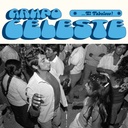TRACKLIST
1. Viento 03:49
2. Como un ave 02:49
3. Mi lamento 04:19
4. Pueblo 02:52
5. Canción del maestro 03:21
6. No te dejaré 03:10
7. Tu retrato 03:27
8. Soy obrero 02:32
9. Hermano 03:28
10. Perdí una flor 03:26
11. Mi pequeña Julieta 03:45
DESCRIPTION
The year was 1974. Until then, only Los Destellos had recorded a non-instrumental cumbia song, "Elsa," in 1970. Víctor Casahuamán Bendezú, a musician, creator and the composer behind Grupo Celeste understood that in order to continue the legacy of Peruvian bands from the sixties like Los Demonios de Corocuchay, Los Yungas, and Los Demonios del Mantaro, it was necessary to address in his lyrics a special and urgent topic: the feeling of displacement from the homeland and the vicissitudes of the migrant sector. The experiences of those who traveled from the provinces to the capital in search of opportunities they could not find in their towns of origin; the process of settling and adapting in a foreign city; the challenges derived from this change of environment; the recognition of a different culture and the creation of a space they understood as their own were the stories that had to be told in the songs. This is why Grupo Celeste was the backbone of cumbia in Peru: it established a common story that thousands of migrants would identify with. From this idea and impetus was born En el campo, the band's first single. Never before had the lyrics of Peruvian cumbia been able to touch the reality of migrants from the countryside living in the capital. The band not only wove the nets of that urgent, necessary reconnection, but also gave birth to one of the most relevant popular singers in the history of Peru: Lorenzo Palacios Quispe.







